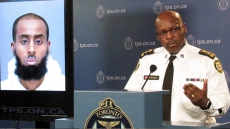VANCOUVER — A police department's refusal to either confirm or deny the use of a controversial and indiscriminate mass-surveillance device means Canadians have no way of knowing if their personal cellphone data is safe from prying eyes, say civil-rights groups.
Pivot Legal Society, a British Columbia-based legal-advocacy organization, filed an appeal with the province's privacy commissioner after Vancouver police refused to disclose documents related to whether they use an invasive technology known as Stingray.
Stingray is a device that mimics a cellular communications tower to trick mobile devices within range to connect to it. This allows the cell-site simulator to intercept both text and audio communication, as well as to extract internal data and pinpoint a device's location.
The device, which operates as a dragnet interceptor, has also been referred to as a King Fisher, an IMSI catcher and a cell-site simulator.
Wednesday was the deadline for interveners to file submissions on Pivot Legal's appeal.
Groups such as the B.C. Civil Liberties Association and OpenMedia argue that police are "stonewalling" attempts by the public to know the extent of the device's use, which is putting Canadians' constitutional rights at risk and preventing law enforcement from being held accountable.

In its submission, filed on Wednesday, OpenMedia wrote that confirming Stingray use is a necessary precursor to the informed public debate needed to develop appropriate policy and legal guidelines.
"(It) is therefore in the public interest for such disclosure to occur."
The BCCLA's submission posited police accountability and regulatory oversight as the core issues.
"The simple fact that we cannot get police to even confirm nor deny whether they exist or whether they're planning to use them means that that critical piece of policy and legal work is prevented from happening," said spokeswoman Micheal Vonn.
"It really is the major roadblock to us shaping the rules for police use around these devices."
Vancouver police have argued that divulging documents on the topic could compromise the effectiveness of their investigative techniques.
But Chris Parsons, of the Munk School of Global Affairs' Citizen Lab at the University of Toronto, dismissed that assertion, noting that its use is widely acknowledged in the United States.
The American Civil Liberties Union has identified 61 agencies in 23 states that own Stingray devices, though the group said that number likely underrepresents the actual total given how many agencies purchase the technology secretly. Known groups include the Federal Bureau of Investigation, the National Security Agency and the Internal Revenue Service.
"Let's face it, we've got TV shows where these things are coming up as plots devices," Parsons said. "They're in the public domain. This isn't a top-secret device or something of that nature.
"Functionally, we understand how they operate, so asking any police service, 'Do you have these? And if so, can you provide documents pertaining to them?' is a fairly trivial sort of request."
Of more concern, he said, would be discovering that a police department lacks policies or regulations around what to do with information collected from random citizens who are not under investigation.



